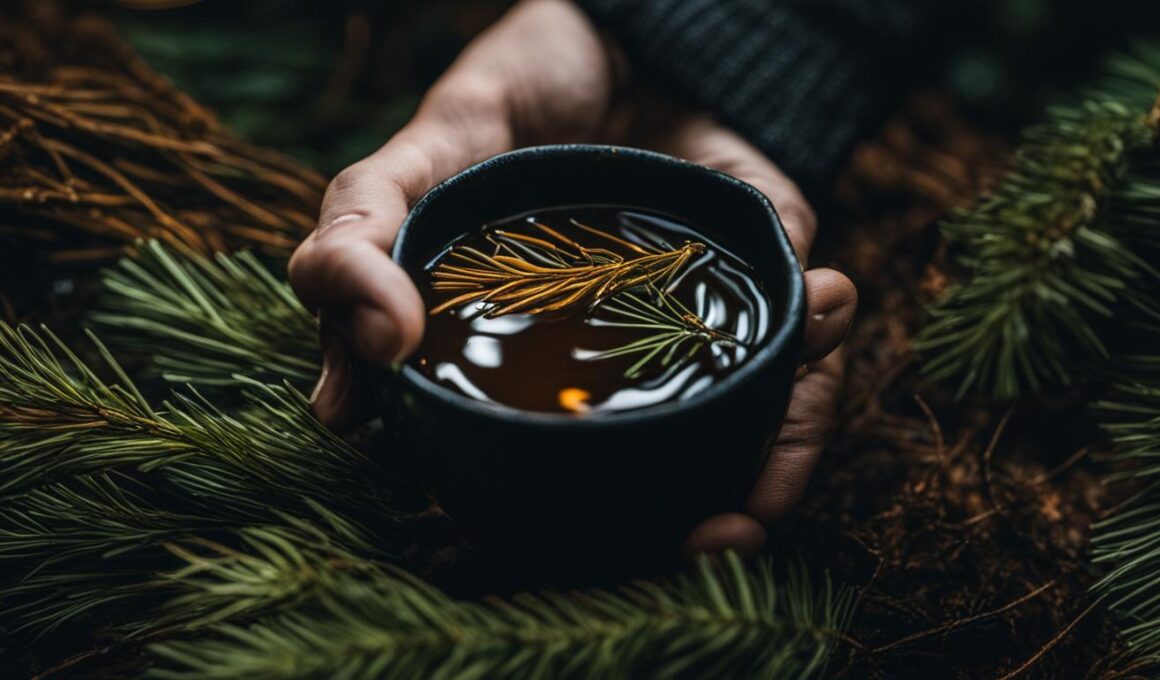Are you aware of the potential risks and safety concerns associated with drinking pine needle tea? While this herbal infusion has gained popularity for its perceived health benefits, it is important to understand the potential dangers it may pose to your health.
Pine needle tea is generally considered safe when prepared correctly and consumed in moderation. However, certain pine species contain harmful toxins that can lead to adverse side effects such as mouth and throat irritation, skin inflammation, nausea, vomiting, dizziness, headaches, and diarrhea.
It is crucial to identify the correct type of pine tree before brewing your tea and to avoid using needles from other pine species that are not safe for consumption. Pregnant women should also steer clear of pine needle tea due to the potential risk of uterine contractions.
Therefore, to ensure your safety and well-being, it is always recommended to consult with a healthcare professional before adding any new herbal teas, including pine needle tea, to your diet. This step becomes even more crucial if you have any pre-existing medical conditions that need to be taken into consideration.
By being informed about the potential risks and taking necessary precautions, you can enjoy the potential benefits of pine needle tea while minimizing the potential health risks.
The Potential Benefits of Pine Needle Tea
While there are potential risks associated with pine needle tea, it is worth noting that there are also some potential benefits. Pine needle tea is rich in vitamins, minerals, and antioxidants, including Vitamin C, which is known for its immune-boosting properties. It may help in reducing the severity and duration of cold symptoms.
One of the key benefits of pine needle tea is its high nutritional value. It contains essential nutrients such as vitamin C, vitamin A, potassium, and magnesium. These nutrients contribute to overall health and support various bodily functions.
Pine needle tea has been traditionally used as a natural remedy for flu and colds. The antioxidants present in pine needles help strengthen the immune system, which can aid in fighting off infections and reducing symptoms.
Research has also shown that pine needle tea may have a positive impact on testosterone levels. Testosterone plays a crucial role in male health, including muscle mass, bone density, and libido. Although more studies are needed, preliminary evidence suggests that pine needle tea could potentially be beneficial for maintaining healthy testosterone levels.
Another area of interest is the potential for pine needle tea to aid in weight management. Some studies have indicated that the compounds found in pine needles may help regulate blood glucose levels and enhance metabolism, which can contribute to maintaining a healthy weight.
However, it is important to note that further research is needed to fully understand the efficacy and safety of these potential benefits. Each individual may respond differently to pine needle tea, and it is always best to consult with a healthcare professional before incorporating it into your diet for any specific health concerns.
In summary, while pine needle tea holds potential benefits, it is essential to approach it with caution and seek professional advice. It is always recommended to gather accurate information on the type of pine used, the preparation method, and proper dosage. By staying informed and taking necessary precautions, you can enjoy the potential benefits of pine needle tea while minimizing the risks.
Can Pine Needle Tea Dangers Also Pose a Risk to Cats if Consumed?
Pine needle tea dangers may pose a risk to cats if consumed. This includes potential harm to their gastrointestinal tract and potential toxicity. It’s essential for pet owners to be informed about ferns and cats safety, and to keep potentially harmful substances out of reach of their feline companions.
Conclusion on Pine Needle Tea Dangers
In conclusion, when considering drinking pine needle tea, it is crucial to be mindful of the potential dangers and safety concerns associated with this herbal beverage. The type of pine tree utilized, the preparation method, and the appropriate dosage are all significant factors to ponder.
To ensure safety, it is highly recommended that you source pine needle tea from a reputable supplier. Additionally, be cautious and avoid using needles from pine species known to be toxic. This will minimize the risk of ingesting harmful substances.
Furthermore, pregnant women should steer clear of consuming pine needle tea due to the potential risk of uterine contractions. As with any herbal tea or supplement, it is always wise to consult with a healthcare professional before incorporating pine needle tea into your diet, particularly if you have pre-existing medical conditions.
By staying informed about the potential dangers, adhering to proper precautions, and seeking professional advice as needed, you can enjoy the potential benefits of pine needle tea while ensuring your safety and well-being.









